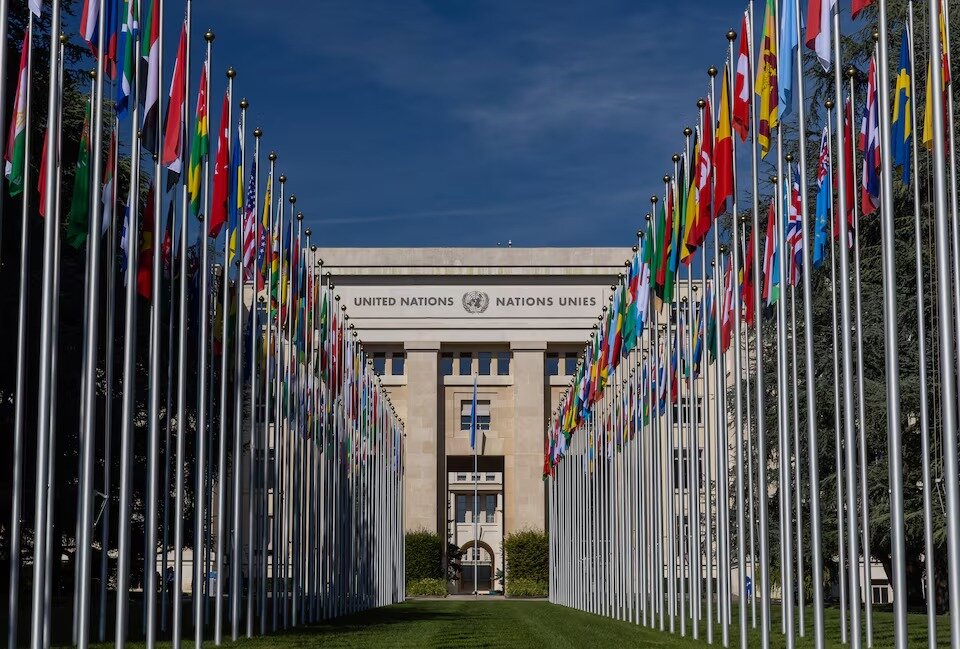UN rights body calls for Israeli arms embargo
UNHRC resolution demands accountability for war crimes

TEHRAN- The United Nations Human Rights Council (UNHRC) has adopted a resolution calling on all countries “to cease the sale, transfer and diversion of arms, munitions and other military equipment to Israel, the occupying power”.
There has been a surge in warnings by senior UN officials and rights groups documenting mass atrocities by the Israeli occupation forces against civilians in the blockaded Gaza Strip.
Many of the harrowing reports involve the use of U.S.-made weapons against the civilian population of Gaza in violation of international law.
The UN body's resolution makes clear an arms embargo is urgent “in order to prevent further violations of international humanitarian law and violations and abuses of human rights”.
The resolution explains the necessity of this measure because of “reasonable grounds to suspect that such goods, technologies or weapons might be used to violate or abuse human rights.”
The UN Human Rights Council recalled the order of the “International Court of Justice” of 26 January 2024, determining that “there is a plausible risk of genocide in Gaza”.
The resolution was brought forward by Pakistan on behalf of the Organization of Islamic Cooperation (OIC).
It marks the first time the UN body has taken a position on the devastating Israeli daily air and ground offensives in Gaza over the past six months.
The sweeping measure takes aim at an array of Israeli military actions.
The UN’s top human rights body stressed the “need to ensure accountability” for all violations of international humanitarian law and international human rights law “in order to end impunity, ensure the access of victims to justice and effective remedies, deter further violations, protect civilians and promote peace”.
The UNHRC expressed grave concern at reports of serious human rights violations and grave breaches of international humanitarian law, including “war crimes, crimes against humanity and possible genocide”.
It deplored the grave consequences of the Israeli war on Gaza, including the high number of casualties, in particular among “Palestinian civilians, including infants, children, women, youth, civil society actors, lawyers, journalists and other media workers, medical personnel, humanitarian aid workers and the highest number of United Nations staff killed anywhere in the world during a conflict”.
Elsewhere in the resolution, the UN Human Rights Council:
Demanded the Israeli regime to immediately lift its illegal blockade on the Gaza Strip and all other forms of collective punishment and siege.
Called for an immediate ceasefire in Gaza.
Condemned Israeli actions that may amount to ethnic cleansing and called for immediate action to prevent the continued forcible transfer of Palestinians within or from Gaza.
Also condemned the use of starvation of civilians as a method of warfare.
The “unlawful denial” by the Israeli regime as an “occupying power” of humanitarian access, was also called out, along with the deprivation of objects indispensable to the survival of civilians, including food, water, electricity, fuel and telecommunications.
Expressed grave concern at statements by Israeli officials amounting to incitement to genocide, and demanded the regime uphold its legal responsibility to prevent genocide.
Recognized that the “grave violations of multiple peremptory norms by Israel constitute a threat to international peace and security,” calling on all countries “to ensure that their arms exports do not contribute to or benefit from this unlawful situation”.
Expressed grave concern at the reverberating effects of the Israeli military’s “use of explosive weapons on hospitals, schools, water, electricity and shelter, which are affecting millions of Palestinians.”
While the resolution is non-binding, it can and has authorized an investigation. Analysts say it will add significant pressure on the U.S., which is Israel’s strongest supporter, to halt the arms supply chain from Washington to Tel Aviv.
The Israeli ambassador walked out midway through the session and called the resolution a “stain on the Human Rights Council and the United Nations as a whole”.
Meirav Eilon Shahar was especially critical towards European countries that backed the measure, calling out Belgium, Luxembourg and Finland by name for supporting the resolution.
There was applause as the resolution was read out.
Palestinian Ambassador Ibrahim Khraishi welcomed the vote but pointed out that some European states had not backed it, despite rising global condemnation of the Israeli genocidal war on Gaza.
“There have been calls for accountability across the world, but that position changes when we’re talking about Israel,” Khraishi told the Council.
The Israeli regime holds the record for the most number of UNHRC resolutions that have been approved against it.
And although the resolution wants the Israeli regime to be held accountable for war crimes and crimes against humanity in the Gaza Strip, analysts believe it is unlikely that any punitive action be taken.
This will ultimately be decided at the UN Security Council where the U.S. has used its veto power at a record level to shield Tel Aviv from any sanctions.
The 47-member UN Rights Council voted 28-6 in favor of the resolution, with 13 abstentions.
The 28 countries that voted in favor are Algeria, Bangladesh, Belgium, Brazil, Burundi, Chile, China, Cote d’Ivoire, Cuba, Eritrea, Finland, Gambia, Ghana, Honduras, Indonesia, Kazakhstan, Kuwait, Kyrgyzstan, Luxembourg, Malaysia, Maldives, Morocco, Qatar, Somalia, South Africa, Sudan, United Arab Emirates, and Vietnam.
The six who voted against are the United States, Argentina, Bulgaria, Germany, Malawi and Paraguay.
And the 13 abstentions are Albania, Benin, Cameroon, Costa Rica, Dominican Republic, France, Georgia, India, Japan, Lithuania, Montenegro, Netherlands, and Romania.
In four other resolutions later on Friday, the Council endorsed the right of the Palestinian people to self-determination, and denounced Israeli settlements in the occupied West Bank and al-Quds (Jerusalem) as well as in the Israeli-occupied Syrian Golan Heights.
Leave a Comment